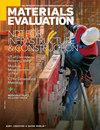Integrating Electromagnetic Acoustic Transducers in a Modular Robotic Gripper for Inspecting Tubular Components
IF 0.3
4区 材料科学
Q4 MATERIALS SCIENCE, CHARACTERIZATION & TESTING
引用次数: 2
Abstract
Tubular structures are critical components in infrastructure such as power plants. Throughout their life, they are subjected to extreme conditions or suffer from defects such as corrosion and cracks. Although regular inspection of these components is necessary, such inspection is limited by safety-related risks and limited access for human inspection. Robots can provide a solution for automatic inspection. The main challenge, however, lies in integrating sensors for nondestructive evaluation with robotic platforms. As part of developing a versatile lizard-inspired tube inspector robot, in this study the authors propose to integrate electromagnetic acoustic transducers into a modular robotic gripper for use in automated ultrasonic inspection. In particular, spiral coils with cylindrical magnets are integrated into a novel friction-based gripper to excite Lamb waves in thin cylindrical structures. To evaluate the performance of the integrated sensors, the gripper was attached to a robotic arm manipulator and tested on pipes of different outer diameters. Two sets of tests were carried out on both defect-free pipes and pipes with simulated defects, including surface partial cracking and corrosion. The inspection results indicated that transmitted and received signals could be acquired with an acceptable signal-to-noise ratio in the time domain. Moreover, the simulated defects could be successfully detected using the integrated robotic sensing system.将电磁声传感器集成到用于检测管状部件的模块化机器人夹具中
管状结构是发电厂等基础设施的关键部件。在它们的整个生命周期中,它们都会受到极端条件的影响,或者会出现腐蚀和裂纹等缺陷。尽管有必要对这些部件进行定期检查,但此类检查受到安全相关风险和人员检查受限的限制。机器人可以为自动检测提供解决方案。然而,主要的挑战在于将用于无损评估的传感器与机器人平台集成。作为开发一种受蜥蜴启发的多功能管道检测机器人的一部分,在这项研究中,作者建议将电磁声换能器集成到一个模块化机器人夹具中,用于自动超声波检测。特别是,将带有圆柱形磁体的螺旋线圈集成到一种新型的基于摩擦的夹具中,以在薄圆柱形结构中激发兰姆波。为了评估集成传感器的性能,将夹具连接到机械臂上,并在不同外径的管道上进行测试。对无缺陷管道和具有模拟缺陷(包括表面局部开裂和腐蚀)的管道进行了两组测试。检测结果表明,在时域上可以以可接受的信噪比获取发射和接收信号。此外,使用集成机器人传感系统可以成功地检测模拟的缺陷。
本文章由计算机程序翻译,如有差异,请以英文原文为准。
求助全文
约1分钟内获得全文
求助全文
来源期刊

Materials Evaluation
工程技术-材料科学:表征与测试
CiteScore
0.90
自引率
16.70%
发文量
35
审稿时长
6-12 weeks
期刊介绍:
Materials Evaluation publishes articles, news and features intended to increase the NDT practitioner’s knowledge of the science and technology involved in the field, bringing informative articles to the NDT public while highlighting the ongoing efforts of ASNT to fulfill its mission. M.E. is a peer-reviewed journal, relying on technicians and researchers to help grow and educate its members by providing relevant, cutting-edge and exclusive content containing technical details and discussions. The only periodical of its kind, M.E. is circulated to members and nonmember paid subscribers. The magazine is truly international in scope, with readers in over 90 nations. The journal’s history and archive reaches back to the earliest formative days of the Society.
 求助内容:
求助内容: 应助结果提醒方式:
应助结果提醒方式:


